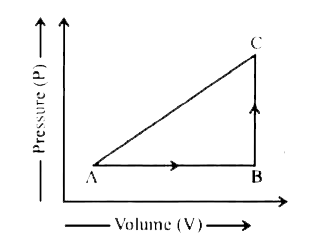The internal energy of a system changes when it undergoes
a cyclic process
an isothermal process
an adiabatic process
any process in which the heat given out by the system is equal to the work done on the system
The correct Answer is:C
Topper's Solved these Questions
- THERMODYNAMICSBOOK - AAKASH SERIESCHAPTER - THERMODYNAMICSEXERCISE - EXERCISE - 1B
32 Videos
- THERMODYNAMICSBOOK - AAKASH SERIESCHAPTER - THERMODYNAMICSEXERCISE - EXERCISE - 2
58 Videos
- THERMODYNAMICSBOOK - AAKASH SERIESCHAPTER - THERMODYNAMICSEXERCISE - Problem
60 Videos
- THERMAL PROPERTIES OF MATTERBOOK - AAKASH SERIESCHAPTER - THERMAL PROPERTIES OF MATTEREXERCISE - ADDITIONAL PRACTICE EXERCISE (LEVEL - II) PRACTICE SHEET (ADVANCED) Integer/Subjective Type Questions
2 Videos
- THERMOMETRY BOOK - AAKASH SERIESCHAPTER - THERMOMETRY EXERCISE - Numerical Exercise (LEVEL- 1)
11 Videos
Similar Questions
Knowledge Check
Statement-1: The internal energy of a system does not change when there is not change in temperature
Statement-2: The internal energy of a gaseous system is state function.AStatement-1 is true, statement-2 is true, statement-2 is a correct explanation for statement-1BStatement-1 is true, statement-2 is true, statement-2 is NOT a correct explanation for statement-1CStatement-1 is true, statement-2 is falseDStatement-1 is false, statement-2 is trueThe internal energy of a system remains constant when it undergoes
Acyclic processBan isothermal processCany process in which the heat given out by the system is equal to work done on the system.Dall of the above.The internal energy of a system remains constant when it undergoes
Aa cyclic process.Ban isothermal processCan adiabatic process.Dany process in which the heat given out by the system is equal to a work done on the system.
Explain the different ways through which internal energy of the system can be changed.
View SolutionThe P - V diagram of a system undergoing thermodynamic changes is as shown in the figure. The work done by the system in going from A→B→C is 30 J. If 68 J of heat is given to the system, then the change in the internal energy of the system between A and C is

View SolutionAssertion : The internal energy of an isothermal process does not change. Reason : The internal energy of a system depends only on pressure of the system.
View SolutionA given system undergoes a change in which up workdone by the system equal the decrease in its internal energy. The system must have undergone an
View SolutionA given system undergoes a change in which the work done by the system equals to the decrease in its internal energy. The system must have undergone an
View Solution
